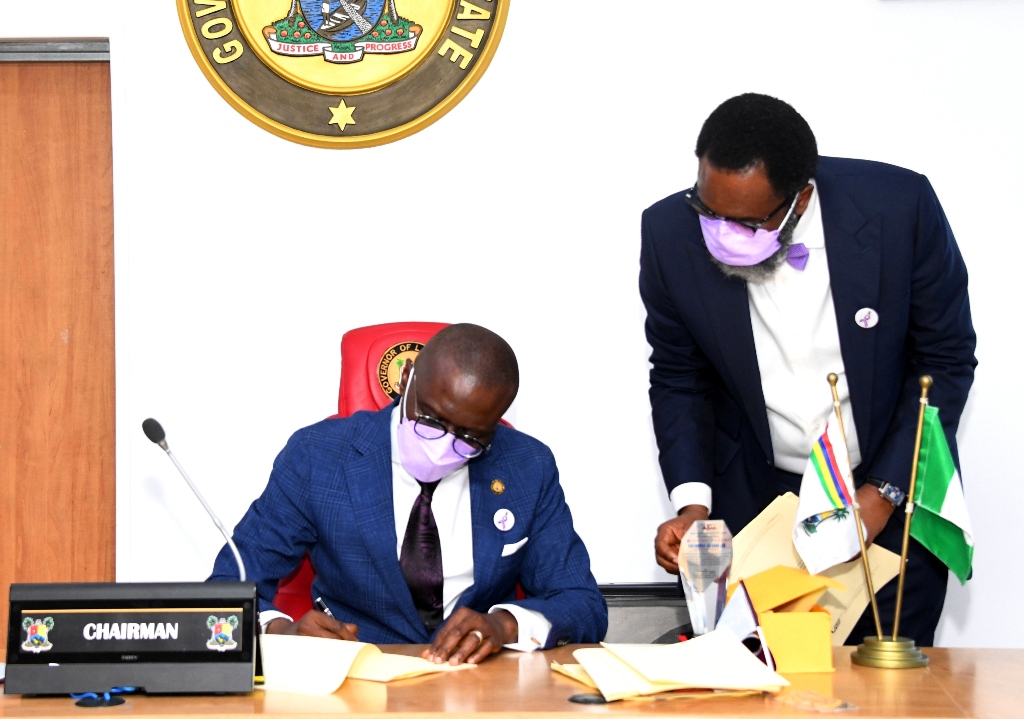Lagos State Governor, Mr. Babajide Sanwo-Olu on Friday signed the 2022 Appropriation Bill of N1.758 trillion christened ‘Budget of Consolidation’ into law.
Governor Sanwo-Olu, while signing the Bill at the Lagos House, Ikeja, said that the capital expenditure stands at N1.166 trillion, representing 66 percent of the budget estimates, while recurrent expenditure is N591 billion, representing 34 percent, to maintain the 66:34 percent budget tradition of Lagos State.
Speaking after signing the 2022 Appropriation bill, Governor Sanwo-Olu said the budget is to consolidate infrastructural development across the state in line with his administration’s T.H.E.M.E.S. developmental agenda to address issues on education, infrastructure, health, technology, social intervention, rail projects and other critical areas.
While explaining the rationale behind the increase in the 2020 Appropriation Bill from the initial N1.388 trillion budget estimates presented to the Lagos State House of Assembly on November 24, Sanwo-Olu said there is a need to capture all financing options for the Blue and Red line rail projects and other ongoing projects in the Budget of Consolidation.
He said: “Let me state at this juncture that the difference between the budget amount presented by the Executive and the final amount passed by the Legislature is largely accounted for by the decision to further accelerate already existing infrastructure projects and bring them to substantial levels of completion.
“We have also decided to capture in the Budget, the financing being deployed towards the Blue Line and the Red Line rail projects by private sector consortia, up to a level that will not put pressure on our cash flow and debt sustainability.
“In addition, this 2022 Appropriation Bill recognises several other already-funded project transactions that are now being accounted for as corporate transactions. What this means is that we are now choosing to capture in the Budget the significant value already accruing to the State from these projects.
“As I said during the presentation to the House of Assembly, this will be the last full-year budget in the tenure of this administration. As a result, a major focus of this budget will be ensuring the completion of all ongoing projects that are critical to achieving our desire to build a Greater Lagos in line with the goals and objectives of the T.H.E.M.E.S development agenda.”
He said the Commissioner for Economic Planning and Budget, Mr. Sam Egube would present to the public the full details and breakdown of the budget in due course.
Governor Sanwo-Olu also commended the Speaker and members of the Lagos State House of Assembly for their cooperation and support, especially in ensuring the quick consideration and passage of the 2022 Appropriation Bill, which he presented on Wednesday, November 24.
The Governor also appreciated Lagosians for their support in ensuring the impressive performance in the implementation of the 2021 budget, against all odds, especially the continuous challenge posed by COVID 19.
“I believe very strongly that we, working together, and with everyone doing their part diligently, will achieve much more in 2022,” the Governor said.
Speaking earlier, the Speaker of the Lagos State House of Assembly, Rt. Hon. Mudasiru Obasa, stated that the budget was given expeditious approval with proper scrutiny within five weeks to ensure that all projects are executed.
Obasa, who was represented by the Chairman of the Lagos State House of Assembly Committee on Appropriation, Hon. Gbolahan Yishawu, said the Babajide Sanwo-Olu administration is heading in the right direction in ensuring that infrastructural projects are put in place across the state in line with the T.H.E.M.E.S. development agenda.
He also commended Governor Sanwo-Olu for completing all the projects he inherited and providing funds for all the ongoing projects in different parts of the State.
Also speaking, Commissioner for Economic Planning and Budget, Sam Egube, commended the Lagos State House of Assembly for the speedy passage of the 2022 Appropriation Bill.
He said he was excited and grateful to all stakeholders for leading the process to the signing of the biggest State’s budget.
It would be recalled that the
Lagos State House of Assembly on Wednesday passed the 2022 budget estimates with a slight increase of the grand total from the initial N1.38 trillion to N1.758 trillion.



